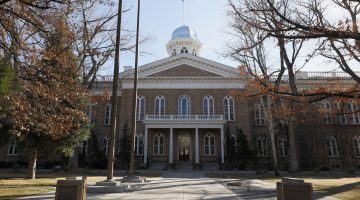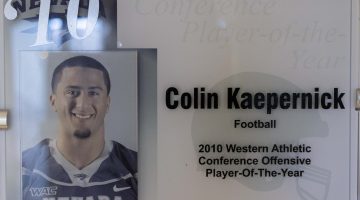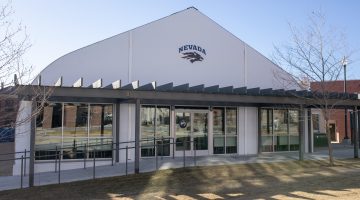
UPDATE
White Supremacy Organizations
President Johnson said he believes politically organized groups are trying to require members on campus.
In a previous article by the Nevada Sagebrush, Patrick Casey, the president of the American Identity Movement, confirmed the group is attempting to reach new people and raise awareness of the organization at the university.
“We, as a university, don’t control the messages of free speech and people have free will to associate with organizations. So, the university is not controlling these organizations and their recruiting attempts and like.”
He said they do continuously put out messages on the importance of recognizing a university as a place which is open for dialogue and membership by being a student or faculty member or staff member; this is an open institution for everyone and want everyone equally comfortable here.
“I know that we haven’t achieved that but that’s our goal,” he said.
In the 2019 Campus Climate Survey, women, African American, members of the LGBT community, individuals with multiple disabilities, low income students and first-generation students responded they were significantly less comfortable than men, white individuals and other people of color, heterosexual individuals, individuals without a disability, non-low-income students and non-first-generation students.
Role of Student, Faculty in hate, bias incidents
President Johnson said they have not invited [Identity Evropa, American Identity Movement and Patriot Front] on campus. He said student groups invite these organizations to campus.
“It is not the role of administration to control thought. It is the responsibility of the university to make sure we have a physically safe place. So, for someone to blame the administration for the rise of hate groups would be unfortunate because this administration had always tried to make strategic plans, value messages and the like as I have said before that encourages people to use speech for good purposes.”
He said it is not the role of administration to stop any group from being on campus unless they’re promoting violence.
“We want all students to feel safe,” President Johnson said. “We want to understand how they can feel safe. Not only is that a matter of police to keep them physically safe. We understand that is is very unsettling to be yelled at, to be yelled at with harmful racial messages, for example.”
President Johnson said they promote green dot training so people understand how to intervene, to stop that kind of hateful speech and if it is safe or not to do so. If it is not safe to do so, he said those incidents should be reported. He also said if the university finds a preponderance of these sorts of events happening, they will turn towards educational devices and the like to try to stop those kind of events.
He said one example of the university doing this is in regards to swastikas which keep appearing on the campus. He said when swastikas appear, they recognized that several get reported. They investigate every one of them to see if we can find the vandal who is drawing these things on walls—many of them have been done in restroom stalls and dormitories. President Johnson said they have had counselling and group meetings come in to tell young people what the swastika means and how harmful it is and how is raises the anxiety level of people of Jewish heritage. He also said they had Hillel come in and provide educational messages and Hillel continues to work with them to help us come up with ways to educate the broader populus about the messages of anti-Semitism.
The President of Hillel, Atty Garfinkle-Berry said there has been around 13 or more swastikas discovered during fall 2019.
“Education is fundamental but it is not enough,” President Johnson said. “That’s why we have the police investigate every one of these as vandalism and if we find the culprit who’s drawing these things, we will prosecute to the extent that we can. It is very difficult, we’re not going to have surveillance cameras in restrooms and that’s where many of these occur… but we have to educate what the swastika means in the twenty first century, how its a form of hateful expression…”
President Johnson said when they get the program established, he will be very happy to financially support the program to do whatever’s necessary to advance inclusion efforts on the campus.
“I know it’s good just to say we’re gonna include a pile of money in this issue but it would not be well spent unless we get the plan first and determine where the financials can be applied appropriately,” Johnson said.
He said when the plan is developed, Gordan-Mora will submit the budget proposal and they will consider the budget proposal seriously.
“We probably do need to spend more funds in this area of diversity and inclusion and as soon as I see some programs that have some real results, we’ll be very happy to invest in it,” President Johnson said.
Original:
In an interview on Wednesday, Dec. 11, 2019, the Nevada Sagebrush asked President Johnson his thoughts on recent hate and bias incidents at the University of Nevada, Reno.
Hate Speech
President Johnson stated hate speech is protected speech. He said what we think of hate speech is unwanted speech that tends to aggravate and separate people.
“I have made subsequent statements that free speech is very broad, but speech can be good; it can be dialogue, debate, sharing of great ideas, but speech can be hateful, it can be bullying, it can be hate speech and that sort of thing,” he said.
The university describes hate speech as speech which offends, threatens or insults people or groups, based on race, color, religion, national origin, gender, sexual orientation, disability or other traits.
He said as a university, it is our responsibility to educate everyone and understand how speech can be used for good purposes by looking at the good parts of speech.
“Hate speech is on the list of bad types of speech that we would like to stamp out here and reveal as hate speech and try to educate how people use their speech for positive purposes,” President Johnson said.
President Johnson said Peter Cvjetanovic and Richard Golgart Jr. did not violate the university’s definition of free speech but they did violate useful uses of free speech.
“What we learned during the Peter Cvjetanovic incident was that we were not completely prepared for it, therefore what we did was reactive,” President Johnson said. “We held student forums, we held faculty forums to have people come out and express how much anxiety has been brought up on campus just two weeks before school started in the fall of 2018.”
He said students were able to come together to express their support for all of the groups on the campus and talk against white supremacy.
“On the one hand, it was really sad that Peter was the face of this incident, nationally, to bring that home to the University of Nevada, Reno of being the face of Charlottesville. Since then, I concluded it was good for us. It was good for us to show us that we’re not looking at the news of a far distant place, that news is here. As a campus, we had to prepare ourselves with educational messages and coming together of student and faculty and staff…”
He said Chief Diversity Officer Eloisa Gordan-Mora is currently developing a strategic plan and action plan regarding institutionalization of ways the university incorporate inclusion into everything the university does. He also said he met with a group of students to involve the students in the strategic plan regarding inclusion.
Peter Cvjetanovic and Charlottesville
President Johnson denied knowing Peter Cvjetanovic, a UNR alumni identified at the Charlottesville ‘Unite the Right’ protest, was a member of Identity Evropa, a white nationalist organization, prior to Charlottesville.
“When I first found out that Peter was the face of the Charlottesville demonstration, that was very shocking and immediately we kicked in our messaging to recognize we had Peter among,” President Johnson said.
President Johnson stated how they tried to make sure the campus understood any white supremacy, any bigotry and any hatred was contrary to the values expressed on campus as an institution. President Johnson said they want a campus of diversity and inclusion.
“We tried to explain that we are a nation governed by the constitution which protects free speech and you can have wild speech and that’s protected,” President Johnson said. “So, we can comment on the content of messages, we can’t control the content of messages.”
President Johnson said they walked a fine line between supporting people who assembled and spoke a variety of views, and, at the same time, expressed their viewpoint that bigotry and white supremacy had no place on campus.
Taylor Johnson can be reached at tkjohnson@sagebrush.unr.edu or on Twitter @taylorkendyll.












